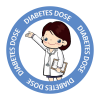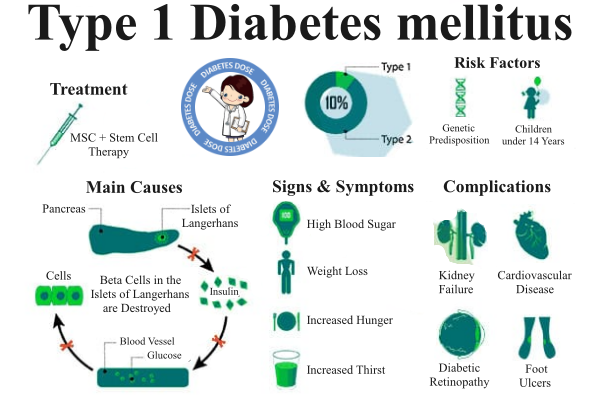Type 1 Diabetes Definition, Causes, Signs & Symptoms, Effects, Prevention, Treatment, Natural Remedies
Diabetes is one of the most prevalent diseases in the world in current times. There are various types of diabetes and they all affect a person due to several causes. The type which affects mostly the kids and young adults is known as Type 1 Diabetes or Juvenile Diabetes.
Although it is not the major kind of diabetes as it happens in only 5% of the people who are diagnosed with Diabetes mellitus. Still, the symptoms as well as the treatment of Type 1 Diabetes are along the similar lines of other types of diabetes.
A good and proper amount of knowledge about the disease helps a lot in preventing it. So let’s learn more about Type 1 Diabetes.
What happens in Type 1 Diabetes: Meaning & Definition
As per the Type 1 Diabetes definition and meaning, when you are diagnosed with this disease, the beta cells (subset of pancreatic cells) are badly destroyed and lose the ability to produce enough insulin that your body needs. Once this happens, the glucose which gets into the bloodstream cannot be absorbed by body cells and it accumulates as sugar in your blood which can further lead to many complications.
The worst thing about Type 1 Diabetes is that it cannot be cured either through drugs or any kind of oral medication. We can only treat it after the symptoms begin to show so that it doesn’t harm our body. But in all cases, a diabetic patient must consult a doctor and only then begin with its diagnosis. Well, it is a chronic sugar disease; therefore, a person with Type 1 Diabetes must get it diagnosed as soon as the early signs show up.
Main Causes of Type 1 Diabetes
All kinds of diabetes are usually caused by the same major causes that affect our body. These causes usually develop due to poor lifestyle habits or unhealthy diet or sometimes they may simply arise due to genetic predisposition. Let’s see some of the most common causes of Type 1 Diabetes so that it will help you know what not to do if you want to avoid this sugar disease.
- Autoimmune Disorder: When the immune system of our body mistakenly attacks and destroys the beta cells (only insulin producing cells in the body), then it leads to a decrease in insulin levels and effects the blood sugar levels in the body.
- Lifestyle Factors: A sedentary lifestyle such as playing video games, lying down on couch and watching flicks for long hours are the main causes of Type 1 Diabetes.
- Genetic Predisposition: However, it is true that Type 1 Diabetes does not occur with direct inheritance. But the individuals who have a family history of Type 1 Diabetes, especially a first-degree relative (parent, sibling or child) have a risk of developing this condition. The risk of type 1 diabetes is higher in case of both parents have this type of diabetes.
- Bad Eating Habits: A poor diet plan and the process of eating after every 15-30 minutes come under the category bad eating habits. It is one of the major causes of Type 1 Diabetes.
- Other Environmental Factors: There are a variety of bad viruses and other kinds of toxins available in your surroundings that can be a cause of Type 1 Diabetes. It also has various effects on different organs in the body. Thus, you must try to avoid being in unhealthy environments.
Signs and Symptoms of Type 1 Diabetes
The signs and symptoms of Type 1 Diabetes can seem like normal at first but if they recur or stay for a prolonged period of time, you must immediately visit your physician and follow his guidelines. There are various signs of Type 1 Diabetes that can be easily identified by you in order to diagnose it quickly and effectively. Some of the first signs of Type 1 Diabetes are as follows:
- There might be increase in thirst at the beginning and thus frequent urination as a result of the same. It is the early symptoms of Type 1 Diabetes in adults.
- Increase in appetite or hunger, no matter how much you eat, is said to be the typical symptoms of Type 1 Diabetes that you must look out for.
- A rapid and mysterious weight loss is one of the symptoms of Type 1 Diabetes in teenage girls and boys. It is due to insulin deficiency, high blood sugar levels and muscle breakdown in the body.
- Feeling tired, drowsy and sluggish at all times are the initial signs of Type 1 Diabetes.
- Frequent changes in the mood and grumpy feeling are the symptoms of Type 1 Diabetes in females. These feeling arise due to uneven variations in blood sugar levels, either high or low.
- The vision of an individual with Type 1 Diabetes starts to become blurry even though he or she doesn’t have any eye disease.
- If your wounds are taking too long to heal than the normal time required, then it is considered as the early signs of Type 1 Diabetes.
- Small kids can go through excessive amount of urination or bedwetting in children (more often than usual) is most common symptoms of Type 1 Diabetes in children.
- The people with Type 1 Diabetes have a high risk of getting several infections like bacterial infections (yeast infections, skin infections and urinary tract infections), oral infections and fungal infections. These are the early symptoms of Type 1 Diabetes in women.
- The numbness or sensations or pain or tingling in hands, arms, feet and legs caused by high blood sugar levels are the most common signs of Type 1 Diabetes.
Note: You must monitor your body to notice the early signs of Type 1 Diabetes to start quick treatment under the guidance of a ‘General Physician’.
Type 1 Diabetes in Adults
Although Type 1 Diabetes is said to happen in children but adults can also diagnosed with this type of diabetes when they become older. Most of the adults think that they cannot get Type 1 Diabetes once they grow old but this is a long held myth. However, when there is an onset of Type 1 Diabetes in adults, their body keeps producing insulin at a lower rate and they may not need additional insulin to supplement their body.
Sometimes when you are getting diagnosed for diabetes, your family history can mislead your doctor. Although your family has a history of Type 2 Diabetes, you may still get Type 1 Diabetes.
Type 1 Diabetes in Children
Most of the Type 1 Diabetes signs and symptoms will be found in children and young adults. Therefore, it is also known as Juvenile Diabetes. If your child suffers from Type 1 Diabetes, then he or she will get it for the rest of his / her life and only the best diabetes treatment is something you can ensure as a parent.
In most of the cases, your child will need daily insulin injections or other kinds of insulin pumps so that the blood sugar range stays as low as possible. In some cases, treatment without insulin is also possible if the body keeps producing a certain amount of insulin to get things going. If you don’t seek proper treatment, huge complications of Type 1 Diabetes can rise in the future for your children.
Type 1 Diabetes in Pregnancy
Many kinds of pregnancy complications can rise if you are pregnant with Type 1 Diabetes. Once you get to know that you are pregnant, you must get your blood sugar levels checked and strive to maintain them during the tenure of pregnancy.
Even after the birth of your baby (post pregnancy), breastfeeding is necessary. Hence, only having control over diabetes will lead you to be able to take care of your new born baby in the best possible way.
Prevention of Type 1 Diabetes
The best way to prevent diabetes without medication is to have a healthy lifestyle and good eating habits. A healthy lifestyle includes proper diet, timely eating, consistent sleep schedule and a regular physical activity (1 hour exercise on a daily basis). If you strive to stay healthy, such complications may not arise.
Even avoiding smoking and drinking can go a long way in keeping yourself in good health and preventing Type 1 Diabetes. Make sure that you get all kinds of vaccines on time as well as adhere to your exercise prescription.
Treatment for Type 1 Diabetes
Even after analysing all the above mentioned causes, signs and symptoms in the body, it is advisable for you to consult a renowned ‘Diabetologist’ before start taking any medicine. If he or she confirms the diagnosis of Type 1 Diabetes in your body and prescribe medicines for the same, then only you should go for the treatment for Type 1 Diabetes.
Drugs & Oral Medications
There are a number of trusted drugs and oral medications are used for the treatment of Type 1 Diabetes. But one must consume these medicines for Type 1 Diabetes under the supervision of a well-known ‘Diabetic Physician’.
Insulin Therapy
It is unfortunate that almost all Type 1 Diabetes patients need insulin therapy because their body is unable to produce insulin. They are required to take insulin injections on a daily basis to replace the insulin. Insulin pump is another method of providing regular supply of insulin to the body.
Blood Glucose Monitoring
It is necessary for the patients with Type 1 Diabetes to check and monitor blood glucose levels on frequent basis. This helps them to avoid major complications and they can also adjust their insulin doses accordingly.
The ultimate goal is to keep fasting blood sugar level in between 80-100 mg/dL and two hours after having meals; it should be in between 140-180 mg/dL. One can monitor their blood sugar levels with the help of blood glucose monitoring device which is known as ‘Glucometer’ (Blood Glucose Meter).
Dietary Management
It is always recommended for a diabetic patient to consult an ‘Endocrinologist’ in order to get a meal plan and a diet chart for Type 1 Diabetes. The patients must track their carbohydrate intake to regulate their blood glucose levels.
Natural Remedies for Type 1 Diabetes
Although there are many natural remedies for Type 1 Diabetes but since the risk factors are high, you must consult a ‘Diabetes Specialist Doctor’. However, if you still wish to seek home remedies, then there are a few things that you can try to cure Type 1 Diabetes.
Honey
As we all know that ‘Honey’ has many anti-inflammatory and medicinal properties that help in regeneration of stem cells in the body. So, the consumption of a little portion of honey can surely help in treating Type 1 Diabetes without insulin.
Stevia Leaves
The appropriate intake of ‘Stevia Leaves’ is one of the best home remedies for Type 1 Diabetes as it has anti diabetic properties.
Avocado
Eating ‘Avocado’ can help in managing your blood sugar levels and thus provide relief from long term side effects of Type 1 Diabetes mellitus.
Yoga
Many people believe that ‘Yoga’ is the permanent cure for Type 1 Diabetes and if we check the facts, it also has been proven to lower blood sugar levels to a certain extent.
Diet Plan
A healthy balanced diet for diabetic patients is the best way to control diabetes without medication. It includes fibre-rich foods, healthy fats, whole grains, lean protein sources, vegetables and fruits.

